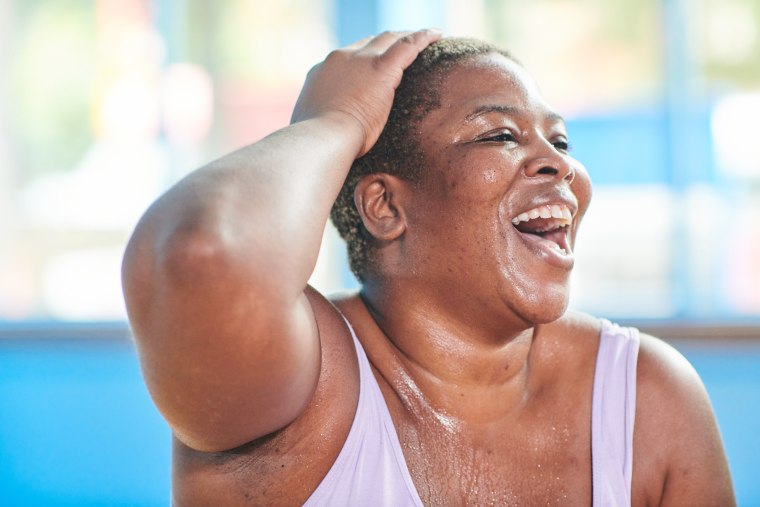More than 20 million people are being affected by a heat wave this week. So it's safe to say that sweat is on our minds a bit more than usual. With temperatures soaring into the 100's in some parts of the country, simply stepping outside may have you dripping within minutes.
But why exactly do we sweat? Whether you're trying to stay cool through the dog days of summer, battle night sweats or are soaked after a workout, we asked dermatologists to break down exactly why your body is perspiring and if it's normal.
Why do people sweat?
“Sweats' primary purpose is to just cool ourselves down,” Dr. Thomas Rohrer, a Boston-based surgical dermatologist, said in an interview. “It’s mostly water and a tiny bit of salt that comes out and a few others things.”
There are sweat glands in different areas all over the body, which explains why you can sweat in the oddest of places: palms, feet, armpits and your back included.
Men generally tend to sweat more than women, but some women sweat more than others. Part of this comes down to how active a person’s sweat glands are, which is thought to be genetic. People who are overweight tend to sweat more as well, though the reason why is unclear, Dr. Melissa Piliang, a dermatologist at the Cleveland Clinic told TODAY.
There are 2 different kinds of sweat
When the body gets too hot, people perspire from eccrine sweat glands. The body will secrete liters of sweat throughout the day — cue the sweaty T-shirts when it’s hot, gym attire after you workout and even work clothes if you’re running to catch the bus.
But people also sweat due to stress. This comes from apocrine sweat glands, which are mainly located in the armpits. Here’s where things get a little … well, sticky.
“While the sweat doesn’t smell when it comes out, it does when it sits there for awhile and the bacteria start to chomp it up and break it down. That’s what smells,” Rohrer explained.
How to deal with both kinds of sweat
A soggy, wet T-shirt or body odor can make you want to run and hide, even though it's completely normal.
Dermatologists have a few things they recommend, the first thing being antiperspirant or deodorant. And there is a difference between the two.
An antiperspirant contains small particles that actually block the pores to prevent sweating. A deodorant masks odors. You can find both at your local pharmacy, but if you feel those aren’t working well enough or are irritating you, a dermatologist can prescribe you a medical antiperspirant.
“An antiperspirant puts tiny plugs in some of the sweat glands. But they need a dry surface to go in, so you have a better chance of getting a dry surface if you put it on at night. It’s more effective than putting it on (in) the morning when you’re likely going to soon start moving around and sweating,” Piliang said.
You can also consider trying moisture-wicking clothing, like a shirt, undershirt or socks made of fibers designed to absorb moisture.
If that doesn’t do the trick, talk to a doctor. You may have hyperhidrosis, the clinical term for excessive sweat. It's thought to be genetic, as it often runs in families.
When you talk to your doctor or dermatologist, you can ask about medical options including certain products or medications, as well as discussing their possible side effects.
There are other bigger procedures as well, including iontophoresis, a procedure that applies a small, local electrical current that reduces the ability of your sweat glands to perspire, Rohrer said. Botox injections can also reduce sweating.
Could sweating be a sign of something more serious?
For the most part, sweating is totally normal, but there are times when it could be something more serious, Piliang noted.
Excessive sweating accompanied with chest pain could be a sign of a heart attack.
Sweating at night can also be cause for concern. Nights sweats can be caused by a few things, including anxiety and stress. Hormonal changes can also cause them. For example, women who’ve recently started or stopped birth control, as well as women going through menopause, can experience night sweats.
Night sweats, however, could also be related to something more serious, like an infection such as tuberculosis or even cancer. If you start experiencing night sweats that last for more than a few days or have other symptoms that accompany them, tell your doctor, Piliang noted.
Long story short: Chances are your damp shirt is normal, but see a doctor if sweating is worrying you.



